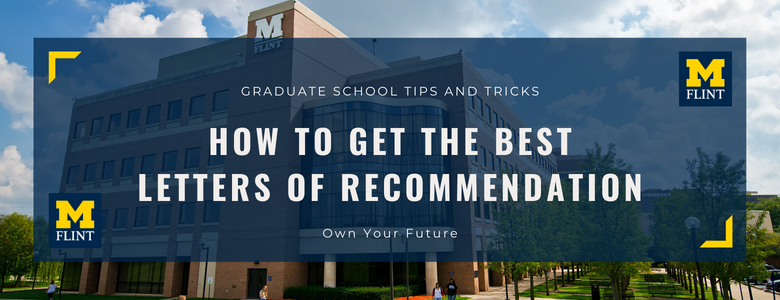As you are reviewing your graduate school possibilities, you may find that some of them will require you to submit letters of recommendation and thus, you want to make sure that you are submitting a well-crafted one.
Through submitting letters of recommendation the admissions team is given a better picture of you as an applicant and offers first hand testimony to your strengths, experiences, and qualifications for the program. When applying to a graduate program, the admissions committee will review your GPA, experiences, research and more but especially when applying to more competitive programs sometimes a good letter of recommendation can help place your admission file above others.
In asking for letters of recommendation you are asking someone to speak on your behalf. With this in mind, there are some other things you can do to make sure that the letter will highlight the things you want them to highlight and help advocate for your spot in the program. Read further to learn how to get the best grad school recommendation letter.
Who to ask for letters of recommendation from for grad school
When you are thinking about who you want to write your letters of recommendation, you need to ask people who know you well and can speak about your accomplishments and your ability to succeed in the program you are applying to. Unless you have been working for many years in your field, the best recommendations for graduate programs tend to be from your past professors.
Hopefully, you have had the opportunity to network with your past professors while you were in your undergraduate or past graduate degrees and you stayed in touch with these professors over the years. Why is this important? By staying in touch you are more likely to receive a great recommendation. So make sure to stay in touch with your past professors, updating them on your academic and professional pursuits. Staying in touch via email is fine, but if you can, also go the extra mile and stay in touch in person as well and you will truly receive a recommendation from someone who really remembers you well.
You never know what doors these relationships may open in the future. They may be able to assist you with future career opportunities or other types of professional development. You do not want to have to reach out to someone that does not remember you, as this is not only uncomfortable for you but it is even more so to them.
If you’ve been out of school for a while, use your work experience to your advantage and ask a past or current supervisor, coworker or mentor for a professional reference. These people can speak to your work ethic, teamwork skills, and other valuable things that will help you greatly in an academic program.
What should I provide my recommenders?
When you are asking people for a letter of recommendation, be sure to ask if they are willing to write a strong letter, referencing your experiences and academic potential. If they say no, you should find someone else who would be willing to do this.
When talking with your potential recommenders you need to make sure that you give them everything that they need to write the letter, as well as enough time to write the recommendation before the deadline. Be sure to give them:
- A list of the school where you are applying and the respective submission deadlines
- Any specific requirements that the schools are requiring for the letters
- A current resume
- A copy of your statement of purpose
Offer to talk to them personally either by phone or electronically to discuss your goals. If they have time to do this it can help them write an even stronger letter of recommendation.
Depending on the academic program, these letters are either submitted with, or attached separately from your application or some schools have a specific process for recommenders to submit their recommendations directly. Be sure to know what the schools you are applying to are asking for and inform your recommenders of these differences.
Following up with your recommenders
It is appropriate to follow up with your recommenders if an application deadline is approaching and you have not received the letters or you have been told that the school is still missing them. Reach out, but do not hound or nag them about this. Also, make sure to send a thank you note to your recommenders to show your appreciation.
Once you are accepted into a program, reach back out and share the good news with your recommenders as they will want to know the outcome. Also, this will allow you to continue to stay in touch for the future that lies in store.
